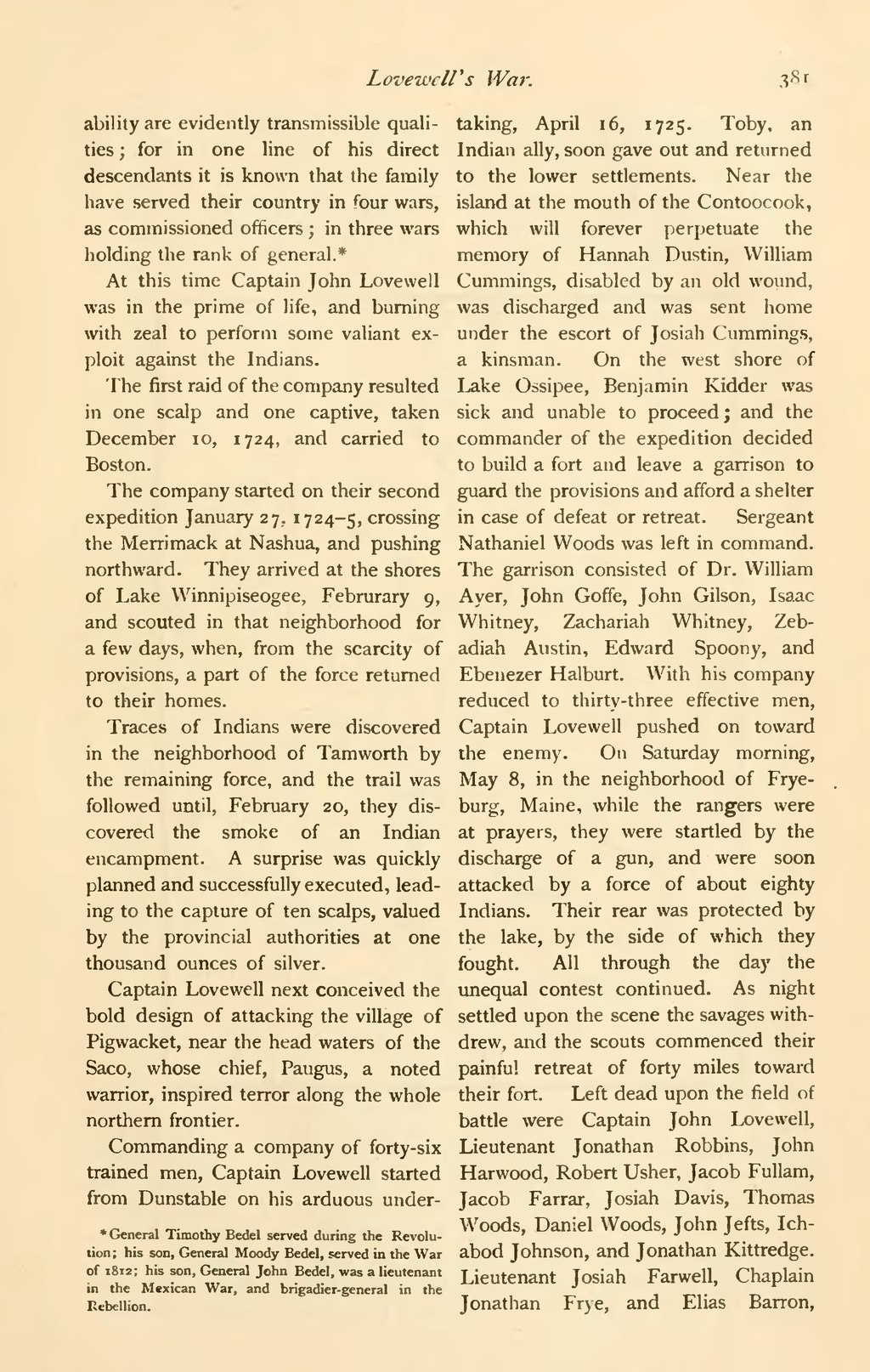LovewelV s War.
��381
��ability are evidently transmissible quali- ties ; for in one line of his direct descendants it is known that the family have served their country in four wars, as commissioned officers ; in three wars holding the rank of general.*
At this time Captain John Lovewell was in the prime of life, and burning with zeal to perform some vahant ex- ploit against the Indians.
The first raid of the company resulted in one scalp and one captive, taken December 10, 1724, and carried to Boston.
The company started on their second expedition January 27, 1724-5, crossing the Merrimack at Nashua, and pushing northward. They arrived at the shores of Lake Winnipiseogee, Februrary 9, and scouted in that neighborhood for a few days, when, from the scarcity of provisions, a part of the force returned to their homes.
Traces of Indians were discovered in the neighborhood of Tamworth by the remaining force, and the trail was followed until, February 20, they dis- covered the smoke of an Indian encampment. A surprise was quickly planned and successfully executed, lead- ing to the capture of ten scalps, valued by the provincial authorities at one thousand ounces of silver.
Captain Lovewell next conceived the bold design of attacking the village of Pigwacket, near the head waters of the Saco, whose chief, Paugus, a noted warrior, inspired terror along the whole northern frontier.
Commanding a company of forty-six trained men. Captain Lovewell started from Dunstable on his arduous under-
- General Timothy Bedel served during the Revolu-
tion ; his son, General Moody Bedel, served in the War of 1812; his son, General John Bedel, was a lieutenant in the Mexican War, and brigadier-general in the Rebellion.
��taking, April 16, 1725. Toby, an Indian ally, soon gave out and returned to the lower settlements. Near the island at the mouth of the Contoocook, which will forever perpetuate the memory of Hannah Dustin, William Cummings, disabled by an old wound, was discharged and was sent home under the escort of Josiah Cummings, a kinsman. On the west shore of Lake Ossipee, Benjamin Kidder was sick and unable to proceed; and the commander of the expedition decided to build a fort and leave a garrison to guard the provisions and afford a shelter in case of defeat or retreat. Sergeant Nathaniel Woods was left in command. The garrison consisted of Dr. William Aver, John Goffe, John Gilson, Isaac Whitney, Zachariah Whitney, Zeb- adiah Austin, Edward Spoony, and Ebenezer Halburt. With his company reduced to thirty-three effective men, Captain Lovewell pushed on toward the enemy. On Saturday morning. May 8, in the neighborhood of Frye- burg, Maine, while the rangers were at prayers, they were startled by the discharge of a gun, and were soon attacked by a force of about eighty Indians. Their rear was protected by the lake, by the side of which they fought. All through the day the vmequal contest continued. As night settled upon the scene the savages with- drew, and the scouts commenced their painful retreat of forty miles toward their fort. Left dead upon the field of battle were Captain John Lovewell, Lieutenant Jonathan Robbins, John Harwood, Robert Usher, Jacob Fullam, Jacob Farrar, Josiah Davis, Thomas Woods, Daniel Woods, John Jefts, Ich- abod Johnson, and Jonathan Kittredge. Lieutenant Josiah Farwell, Chaplain Jonathan Frye, and Elias Barron,
�� �
